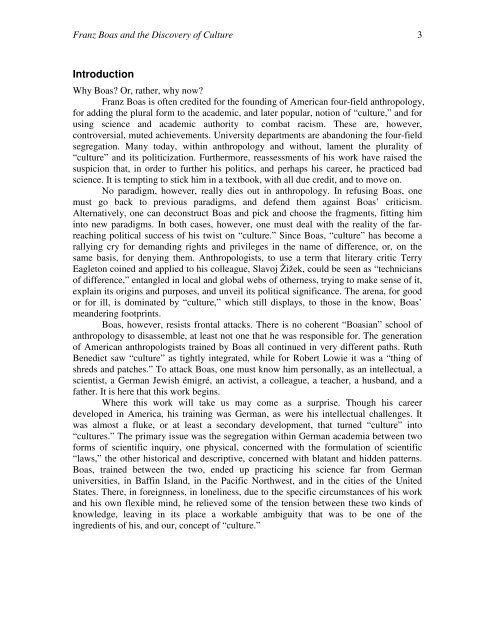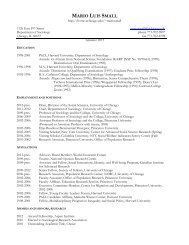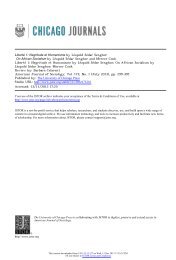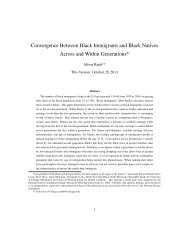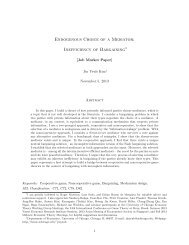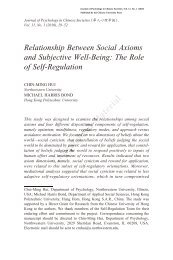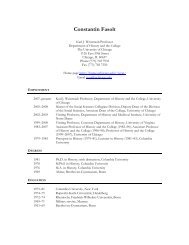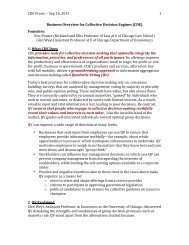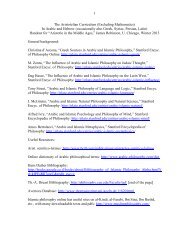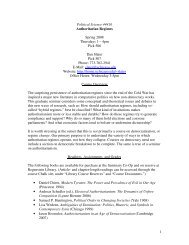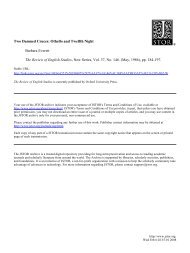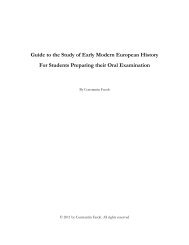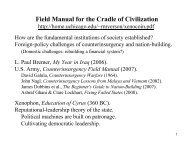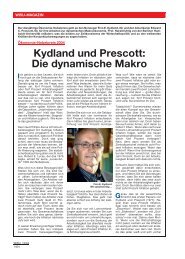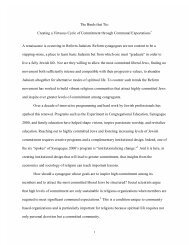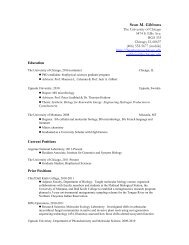Franz Boas and the Discovery of Culture - Personal Web Pages ...
Franz Boas and the Discovery of Culture - Personal Web Pages ...
Franz Boas and the Discovery of Culture - Personal Web Pages ...
Create successful ePaper yourself
Turn your PDF publications into a flip-book with our unique Google optimized e-Paper software.
<strong>Franz</strong> <strong>Boas</strong> <strong>and</strong> <strong>the</strong> <strong>Discovery</strong> <strong>of</strong> <strong>Culture</strong> 3<br />
Introduction<br />
Why <strong>Boas</strong>? Or, ra<strong>the</strong>r, why now?<br />
<strong>Franz</strong> <strong>Boas</strong> is <strong>of</strong>ten credited for <strong>the</strong> founding <strong>of</strong> American four-field anthropology,<br />
for adding <strong>the</strong> plural form to <strong>the</strong> academic, <strong>and</strong> later popular, notion <strong>of</strong> “culture,” <strong>and</strong> for<br />
using science <strong>and</strong> academic authority to combat racism. These are, however,<br />
controversial, muted achievements. University departments are ab<strong>and</strong>oning <strong>the</strong> four-field<br />
segregation. Many today, within anthropology <strong>and</strong> without, lament <strong>the</strong> plurality <strong>of</strong><br />
“culture” <strong>and</strong> its politicization. Fur<strong>the</strong>rmore, reassessments <strong>of</strong> his work have raised <strong>the</strong><br />
suspicion that, in order to fur<strong>the</strong>r his politics, <strong>and</strong> perhaps his career, he practiced bad<br />
science. It is tempting to stick him in a textbook, with all due credit, <strong>and</strong> to move on.<br />
No paradigm, however, really dies out in anthropology. In refusing <strong>Boas</strong>, one<br />
must go back to previous paradigms, <strong>and</strong> defend <strong>the</strong>m against <strong>Boas</strong>’ criticism.<br />
Alternatively, one can deconstruct <strong>Boas</strong> <strong>and</strong> pick <strong>and</strong> choose <strong>the</strong> fragments, fitting him<br />
into new paradigms. In both cases, however, one must deal with <strong>the</strong> reality <strong>of</strong> <strong>the</strong> farreaching<br />
political success <strong>of</strong> his twist on “culture.” Since <strong>Boas</strong>, “culture” has become a<br />
rallying cry for dem<strong>and</strong>ing rights <strong>and</strong> privileges in <strong>the</strong> name <strong>of</strong> difference, or, on <strong>the</strong><br />
same basis, for denying <strong>the</strong>m. Anthropologists, to use a term that literary critic Terry<br />
Eagleton coined <strong>and</strong> applied to his colleague, Slavoj Žižek, could be seen as “technicians<br />
<strong>of</strong> difference,” entangled in local <strong>and</strong> global webs <strong>of</strong> o<strong>the</strong>rness, trying to make sense <strong>of</strong> it,<br />
explain its origins <strong>and</strong> purposes, <strong>and</strong> unveil its political significance. The arena, for good<br />
or for ill, is dominated by “culture,” which still displays, to those in <strong>the</strong> know, <strong>Boas</strong>’<br />
me<strong>and</strong>ering footprints.<br />
<strong>Boas</strong>, however, resists frontal attacks. There is no coherent “<strong>Boas</strong>ian” school <strong>of</strong><br />
anthropology to disassemble, at least not one that he was responsible for. The generation<br />
<strong>of</strong> American anthropologists trained by <strong>Boas</strong> all continued in very different paths. Ruth<br />
Benedict saw “culture” as tightly integrated, while for Robert Lowie it was a “thing <strong>of</strong><br />
shreds <strong>and</strong> patches.” To attack <strong>Boas</strong>, one must know him personally, as an intellectual, a<br />
scientist, a German Jewish émigré, an activist, a colleague, a teacher, a husb<strong>and</strong>, <strong>and</strong> a<br />
fa<strong>the</strong>r. It is here that this work begins.<br />
Where this work will take us may come as a surprise. Though his career<br />
developed in America, his training was German, as were his intellectual challenges. It<br />
was almost a fluke, or at least a secondary development, that turned “culture” into<br />
“cultures.” The primary issue was <strong>the</strong> segregation within German academia between two<br />
forms <strong>of</strong> scientific inquiry, one physical, concerned with <strong>the</strong> formulation <strong>of</strong> scientific<br />
“laws,” <strong>the</strong> o<strong>the</strong>r historical <strong>and</strong> descriptive, concerned with blatant <strong>and</strong> hidden patterns.<br />
<strong>Boas</strong>, trained between <strong>the</strong> two, ended up practicing his science far from German<br />
universities, in Baffin Isl<strong>and</strong>, in <strong>the</strong> Pacific Northwest, <strong>and</strong> in <strong>the</strong> cities <strong>of</strong> <strong>the</strong> United<br />
States. There, in foreignness, in loneliness, due to <strong>the</strong> specific circumstances <strong>of</strong> his work<br />
<strong>and</strong> his own flexible mind, he relieved some <strong>of</strong> <strong>the</strong> tension between <strong>the</strong>se two kinds <strong>of</strong><br />
knowledge, leaving in its place a workable ambiguity that was to be one <strong>of</strong> <strong>the</strong><br />
ingredients <strong>of</strong> his, <strong>and</strong> our, concept <strong>of</strong> “culture.”


